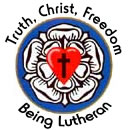Visible Unity through Grand Deception

The term "Lutheran" sparks many and various associations. Being Lutheran generally refers to membership in a Lutheran church. For some, being Lutheran also implies being of German or Scandinavian extraction. For others, being Lutheran means having liturgical worship, like the Roman Catholics or Anglican or Orthodox churches. Theologically, being Lutheran is often synonymous with the Reformation of the church through the Doctrine of Justification by Faith. In relation to other churches, being Lutheran denotes adhering to written statements of faith (confessions) which serve as accurate expositions of Scripture.
The name "Lutheran" does not, however, always carry these connotations. For many, the word "Lutheran" might have no meaning whatsoever. Others would recognize the name but would associate it with the civil rights leader, Dr. Martin Luther King, Jr. Others still would hear the name with a sense of disdain as referring to the man who divided the Christian church in the western world.
None of these associations and meanings would exist today if one man in the early 1500's had not changed his name from Martin Luder to Martin Luther.
 |
|
Then, through his study of the Bible, Luther discovered that God made sinners right (justification) by faith in Jesus Christ and not by works prescribed by the church. God's righteousness is a promise freely given to sinners through faith. This insight gave Luther the certainty of forgiveness of sins. This certainty not only freed Luther from his guilt, but it also freed him from the church's legalistic system of penance.
To reflect his newly found freedom, the young monk Martin changed the spelling of his surname from Luder to Luther to reflect the Latin name Eleutherius. Eleutherius is a cognate of the Greek word eleutheros (έλεύθερος) which means "free." Thus, being Lutheran means being set free from the power of sin, death, and the devil. This freedom is given by God's grace alone which comes through God's word alone which evokes faith alone in Jesus Christ alone.

Luther's signature reflecting eleutheros - being free - in a letter to Spalatin from 20 January 1519
In his Gospel, John reminds us that if we remain in Jesus' word we will know the truth, and the truth will make us free (eleutheros - Jn. 8: 31-32). Jesus' word (his gospel) makes us truly free because Jesus is the way and the truth and the life (Jn. 14:6). Luther could not stress this enough. In fact, Luther staked his life on the truth of the gospel Jesus Christ and on those truths congruent with his gospel. In so doing, Luther with this truth changed the world.
Luther's name change reminds us very simply of the essence of being Lutheran. Lutherans are those who belong to a Lutheran church and who live by the truth which comes alone in Jesus Christ. Equally, those who do not live by the truth, even if they belong to a Lutheran church, are not Lutheran.
References
Hans-Walter Krumwiede, Glaubenszuversicht und Weltgestaltung bei Martin Luther. Mit einem Ausblick auf Dietrich Bonhoeffer (Gφttingen: Vandenhoeck & Ruprecht, 1983), pp. 54-55.
Bernd Moeller and Karl Stackmann, "Luder–Luther–Eleutherius: Erwδgungen zu Luthers Namen," in Nachrichten der Akamemie der Wissenschaften in Gφttingen. I. Philologisch-Historische Klasse, (Gφttingen, Vandenhoeck & Ruprecht, 1981).
© 2001-2009 CCM Verax. All rights reserved.
Website Comments: webmaster@ccmverax.org